
Thank you for stopping by and writing here. Tonle Sap is an amazing place indeed. There are so many things to learn and explore in this eco system.
5,013 views
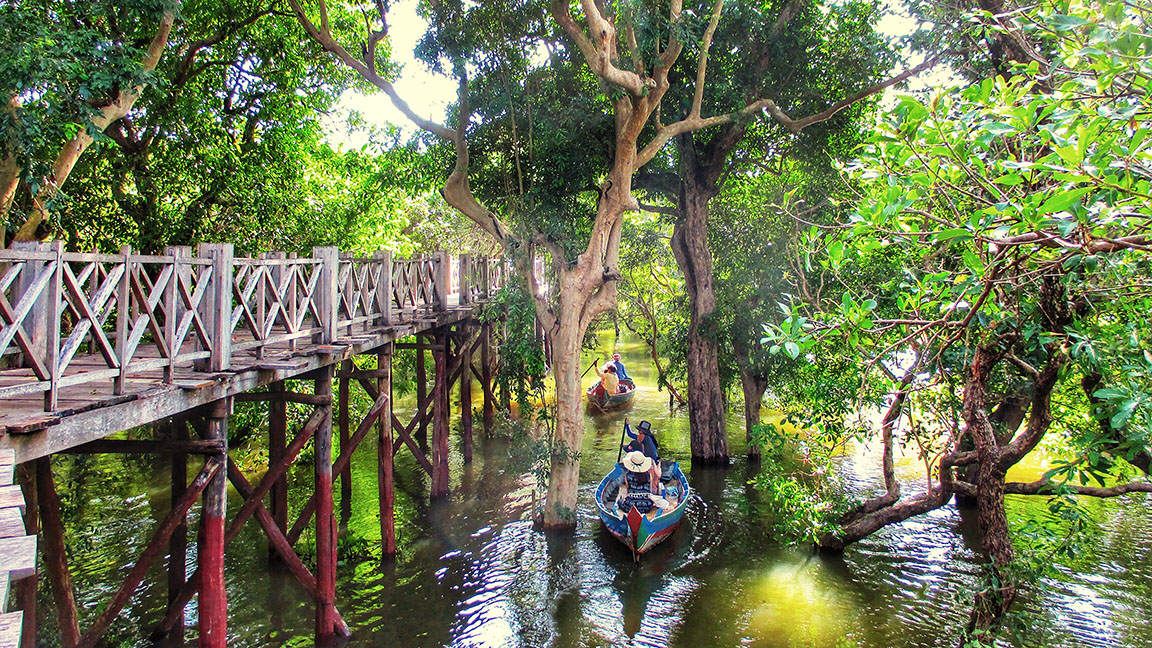
A trip to Cambodia offers some of the most incredible and one-of-a-kind experiences. Thinking of ancient temples and historic ruins? Well, of course that’s what most travelers head to Cambodia for but are pleasantly surprised with the “Floating Villages”. This land boasts of several unique features but the Floating Villages are grabbing the limelight for the extraordinary experience they offer. Being a country with abundant waterways, floating villages seemed to be a great way for locals to optimize this natural resource to their advantage. A large part of the ancient Khmer people's lives was water, and it remains a significant part of the lives of modern-day Cambodians as well. Because the water levels fluctuate so drastically each year, they built a floating village to allow the water to flow. A common sight in Cambodia, floating villages have been in existence for centuries here.
These floating villages are found on Tonle Sap Lake (Vast body of freshwater). Tonle Sap is a UNESCO Biosphere Reserve and Southeast Asia's largest lake. It features a unique flow pattern. During the dry season, the lake flows into the Mekong River while during the wet season, it remains inland, extending its size from 2,700 sq km to 16,000 sq km. When it rains heavily, one cannot visit as the water level is very high. During the dry season, the water recedes and the boats cannot float at all. Choosing a season in between to visit is critical to enjoy the floating village experience.
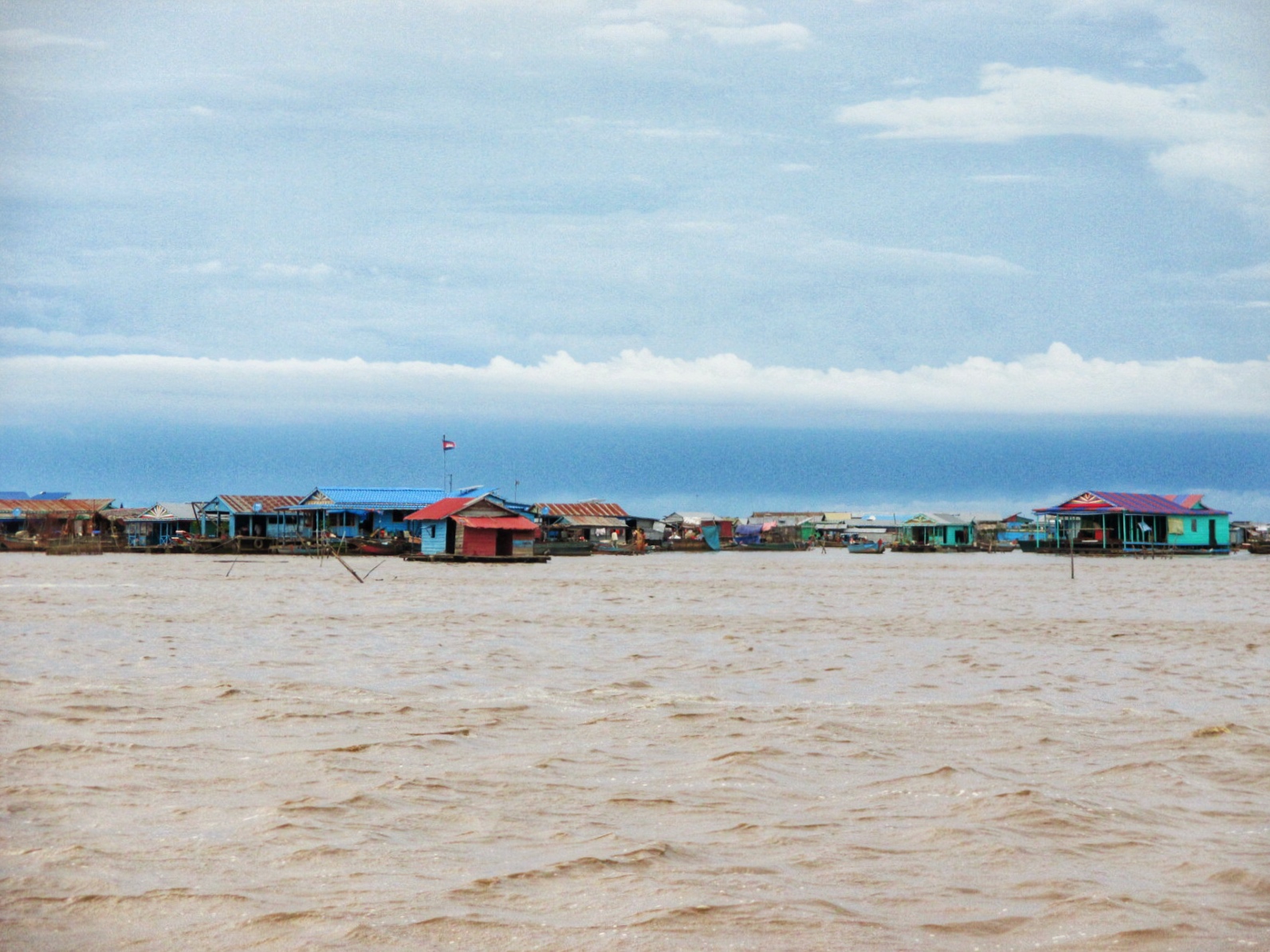
Houses floating on water - this is the sight of Chong Kneas floating village as we approach
People have been living in floating villages for ages and it is not specifically created to attract tourists. Touring floating villages is a cultural extravaganza, one that is a MUST do. There are 4 distinct floating villages near Siem Reap namely, Kompong Khleang, Kompong Phluk, Chong Kneas and Mechrey. Each village narrates a different life story and is an authentic experience. I visited two of the floating villages, Chong Kneas and Kompong Phluk. People have mixed reviews and experiences, but I thoroughly enjoyed both the visits, one solo and the other with my family.
The floating village of Chong Kneas is the most popular floating village and has the most visitors. The village is located on the extensive and murky Tonle Sap Lake and there are over 1,000 families dwelling here. For generations, the livelihood of these locals is through fishing, farming, and trading goods with other villages. Life in the floating village is not easy, but it has a certain charm and simplicity. A tour offers a truly authentic experience with the chance to witness the different cultures and ways of life of this resilient community. I booked my tour through the hotel, and it turned out to be quite expensive. I would recommend that you book a tour online with a reputed operator.
Checkout floating village tours in Cambodia.
A 30-minute drive from Siem Reap in a tuk-tuk (local 3-wheel transportation) reached me to the boarding point for my visit to Chong Kneas.My ride and driver were arranged by the Diamond D'Angkor Hotel where I had stayed. I preferred this way to avoid falling into any traps and scams. Unfortunately, there are numerous agents offering cheap tour services that end up being a farce and leading to loss of money and time of visitors. My tuk-tuk driver (Mr. Sea) was a pleasant local and I invited him to join me on my trip to explore Chong Kneas.
I had been warned that the boatmen usually take visitors to unnecessary places to patronize stalls inside the village where they get commissions and compel you to buy things. They also steer tourists to visit a school or orphanage in the floating village and prompt acts of charity to help the local community. They suggest buying bags of rice for the children or donating money, which is usually pocketed by them. TripAdvisor reviews for Chong Kneas floating village show a lot of complaints from tourists. The tuk-tuk driver will shield you from such practices and you will have a smooth ride and pleasant experience. Of course, my driver was delighted and obliged to join me as not many visitors invite them to be part of their experience. A bonus is that there is no entry/access fee for locals to any of the places in Cambodia so there was no extra cost for him to accompany me. After getting my ticket at the counter, two boatmen, the driver and myself set out in the boat to enjoy the sights and sounds of Chong Kneas.
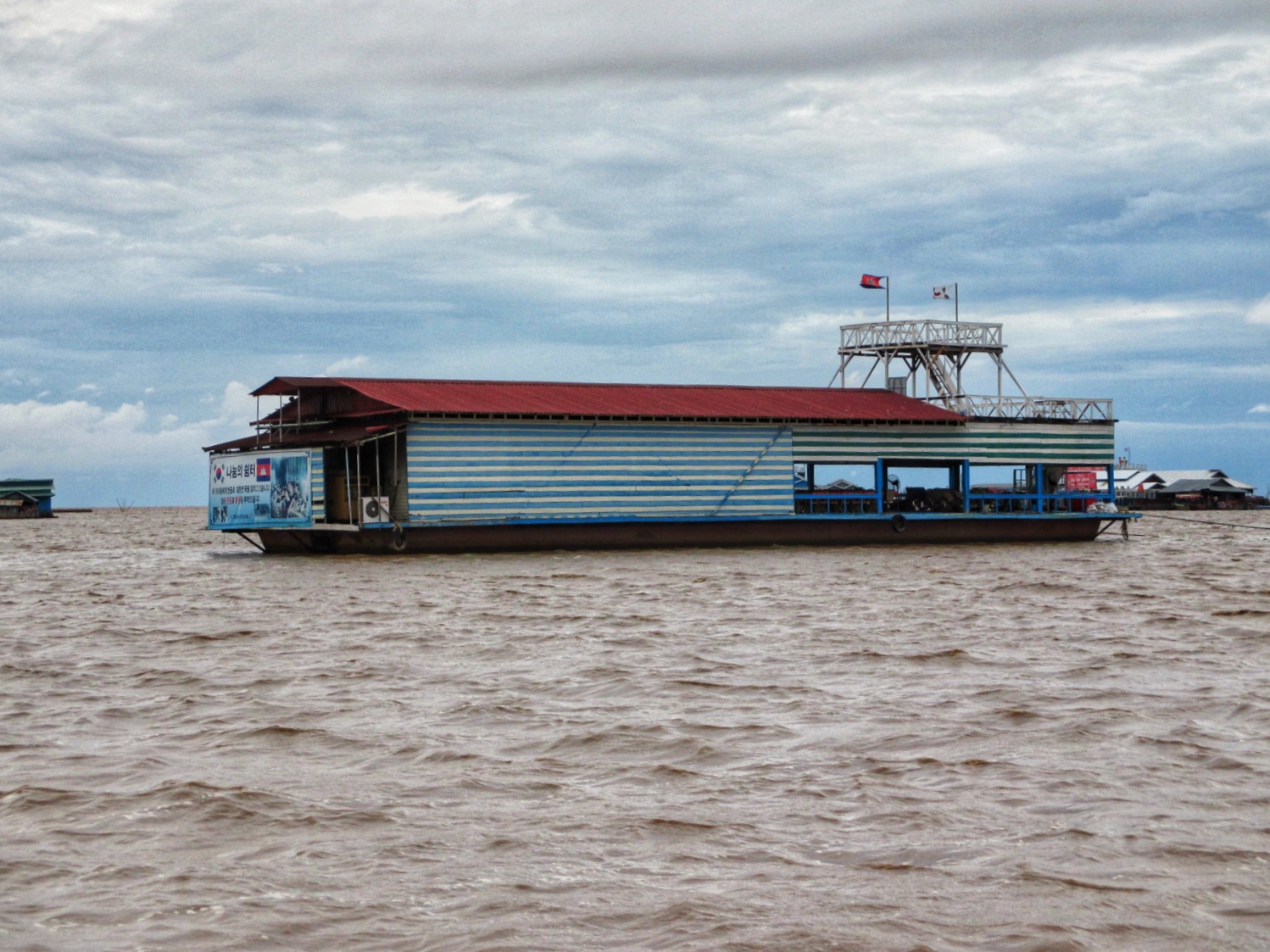
This is a restaurant in Chong Kneas floating village that offers a unique dining experience
I was fortunate that there was water during my visit, although it was the dry season. Many times, visitors do not get to enjoy this experience as there is not enough water. Being off season, there were only three boats with visitors that day making it an indulgent experience. I spent over 3 hours meandering through this unique ecosystem immersed in the ambience, a splendid experience!
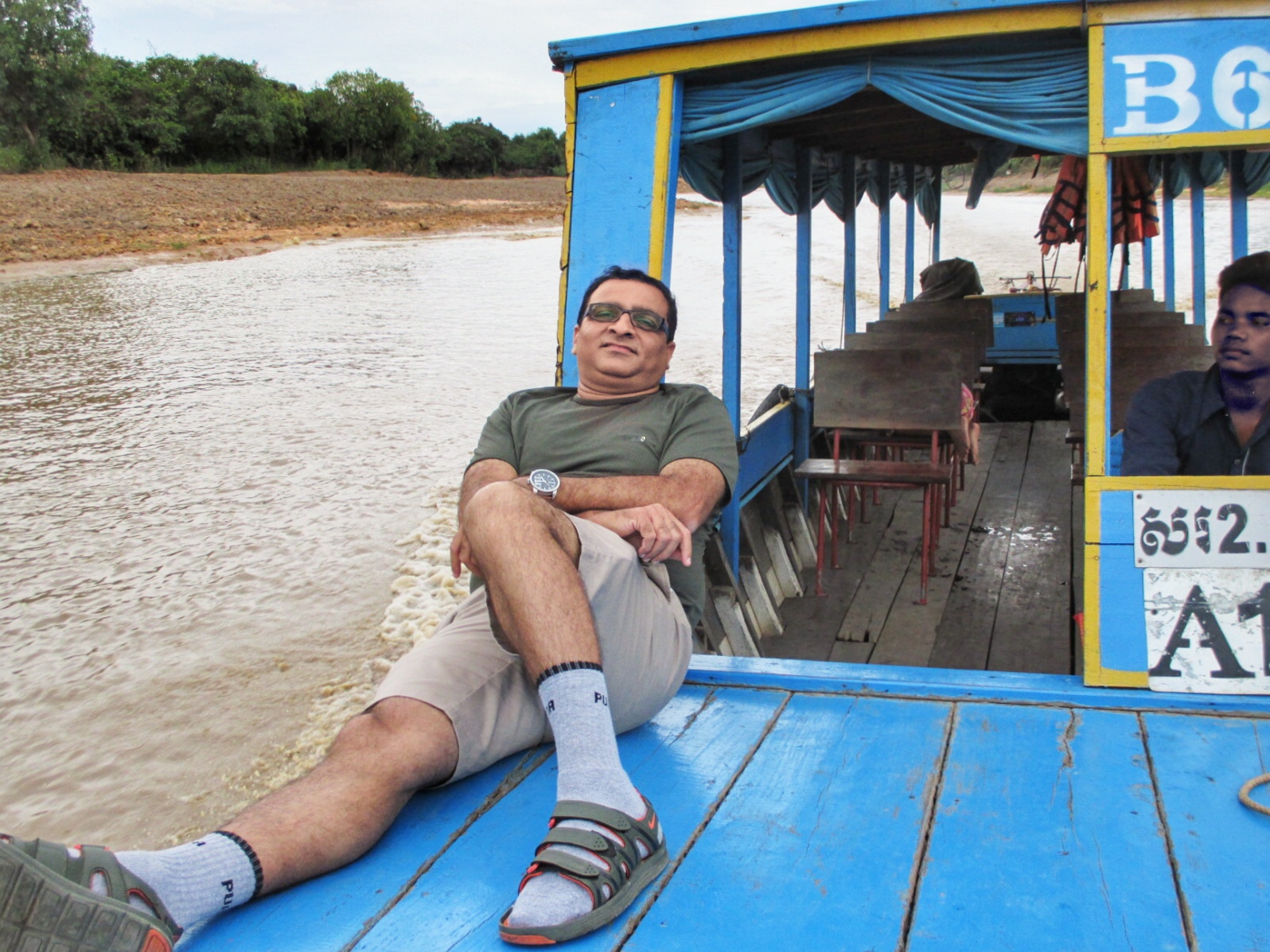
A relaxed boat ride through the passage of Chong Kneas floating village definitely called for a photo
I was fascinated by the "infrastructure" of the place. The homes are floating platforms made from bamboo and other materials, and they are connected to one another by a network of rickety wooden walkways. Despite its remote location and primitive structure, the village is home to a thriving community of fishermen and their families. Life in the village revolves around the lake, which provides both food and income for the residents. Fishing is the main source of income, and most families own at least one boat. The village also has a small school, a clinic, and a market where villagers can sell their catch.
Chong Kneas is a unique place, and I got a glimpse of traditional Cambodian life. The village is also famous for its "fireflies," which are actually glow-worms that light up the night sky. There are floating markets, where locals sell everything from fruits and vegetables to fish and souvenirs. The village also has a number of other attractions that are worth checking out. We visited the crocodile and snake farms, where I saw these creatures up close and learned about how they are raised for their meat and skin. Not all of us may subscribe to these activities but they are a reality in this part of the world. All in all, the visit to Chong Kneas floating village was an enriching experience for me.
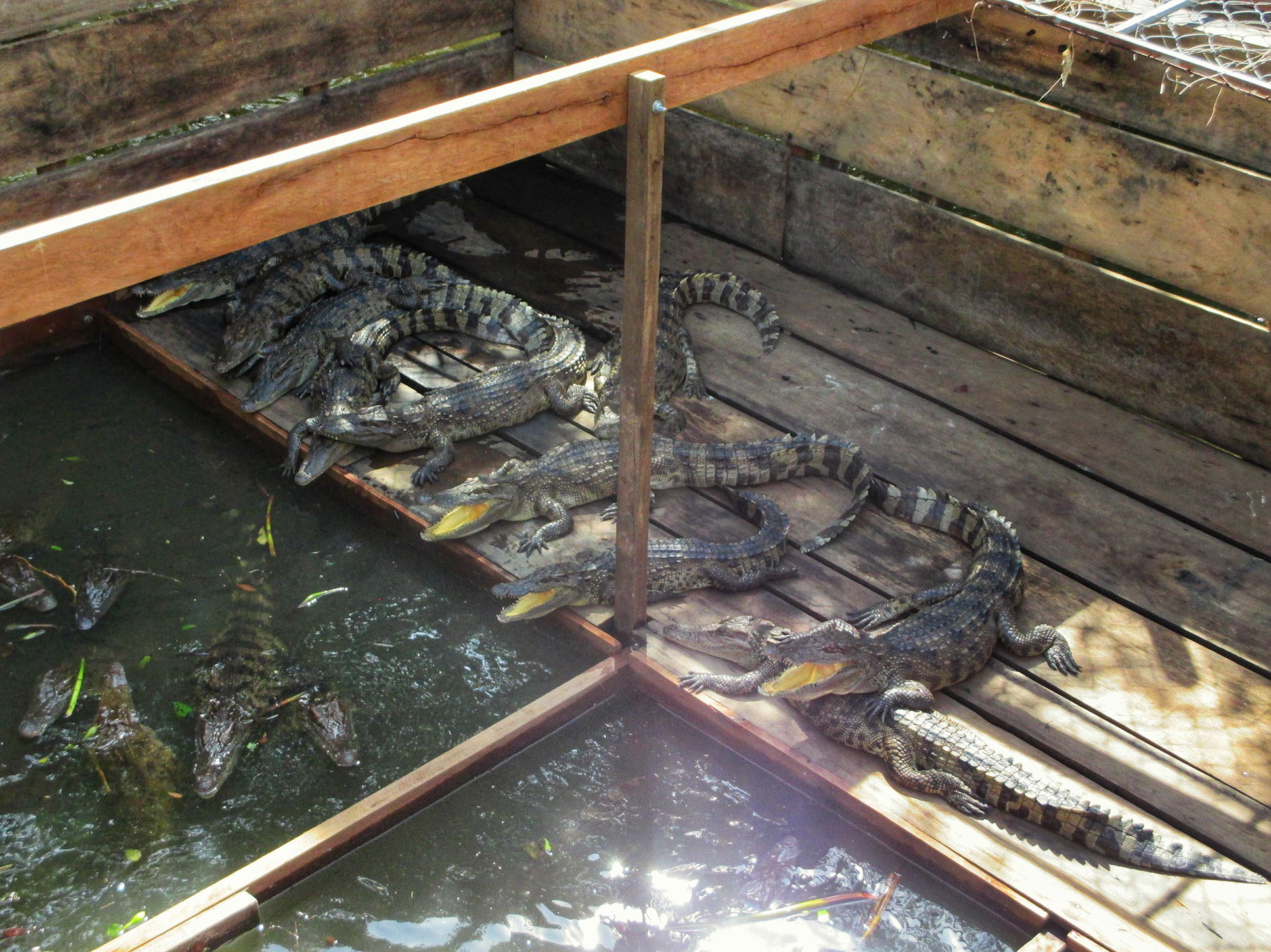
The crocodile farm in Chong Kneas where they are breeded for their meat and skin
The second time that I visited Cambodia was with my family. This time we decided to visit Kampong Phluk floating village, which is more developed and less popular than Chong Kneas. Kampong Phluk, translates to "harbor of the tusks". According to local legend, the river was created by elephants who often traveled in this region. As per another story, piles of elephant tusks are buried in the riverbed. Established in the early 1800s, Kampong Phluk floating village is one of the oldest villages in Cambodia.
We reached the boarding point after a 30-minute tuk-tuk ride from Siem Reap. There were a row of boats waiting to take visitors on a tour of Kampong Phluk floating village. After purchasing our tickets, we boarded the boat and began our experience of this unique village. A fascinating feature of this village is that it is built on stilts in the middle of the Tonle Sap. The village is home to about 4,000 Vietnamese-Cambodian people who live in houses that are built on stilts and connected by a network of wooden walkways. The village has its school, health center, pagoda, church and grocery stores.
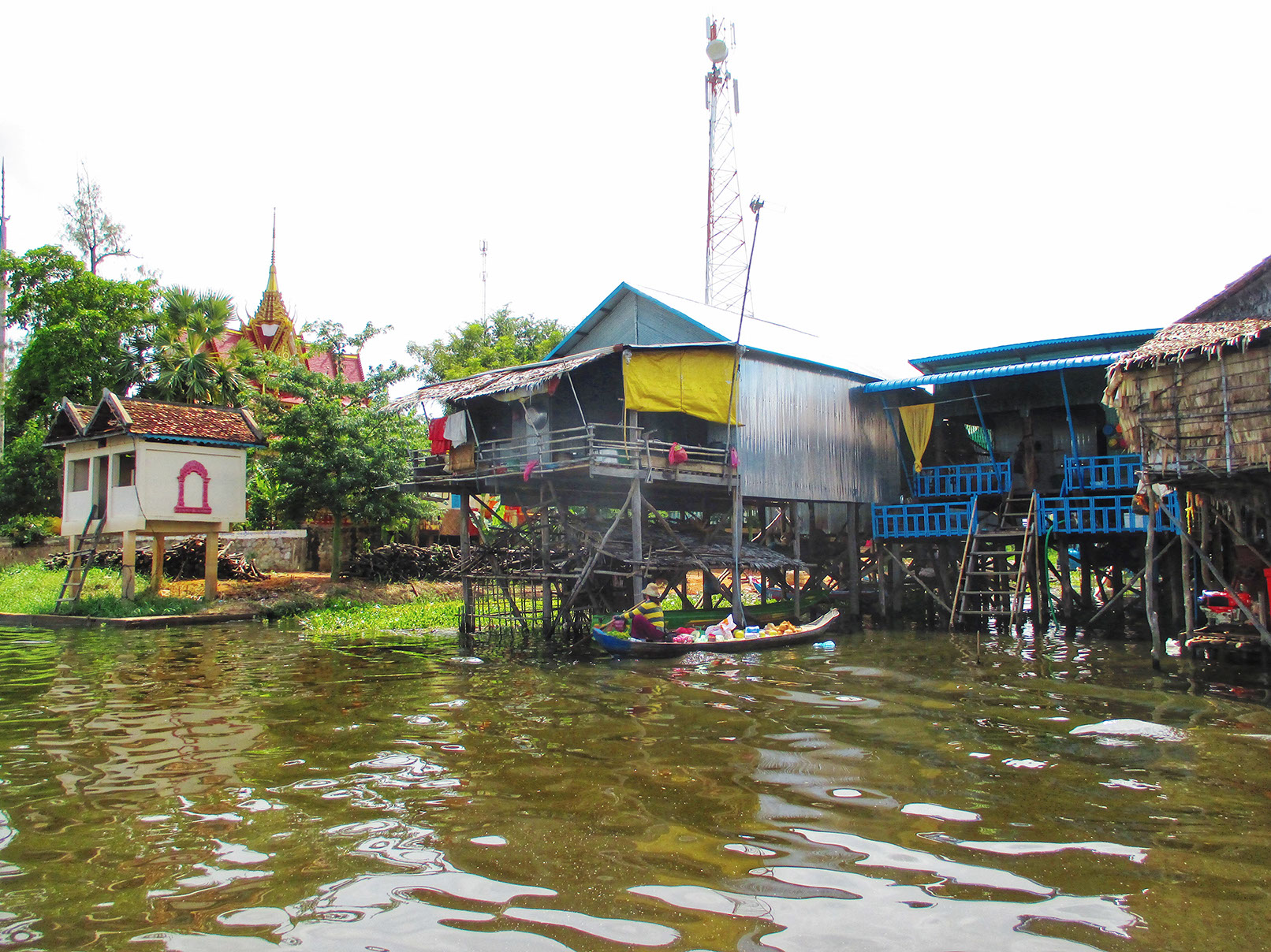
The self-sufficient floating village of Kampong Phluk has its own Pagoda (the buddhist temple)
Kampong Phluk is made up of three different villages, each with its own unique character. The first village is built on stilts and is used as a base for fishing activities. The second village is located on dry land and is home to the majority of the villagers. The third village is only accessible during the wet season and is used for farming rice.
The villagers rely on the lake for their livelihood as they fish and farm rice in the floating fields around the village. Their intimate relationship with the lake has trained villagers to foresee changes in the weather and prepare for them accordingly. This close connection to the natural world is a defining feature of Kampong Phluk's culture. The boatmen maneuvered through this amazing ecosystem leaving us in awe of the locals and their adaptability.
Our tuk-tuk driver joined us on our boat ride and between him and the boatmen, we were enlightened on the incredible history of this resilient village. Before the Khmer Rouge, Kampong Phluk was not as organized as it is today. It was rather a community of fishermen and their families (mostly from Vietnam) who lived along the lake. The Khmer Rouge arrived in Siem Reap in 1975 and inflicted immense destruction. After the Khmer Rouge, gradually, people returned and established their community again in the area.
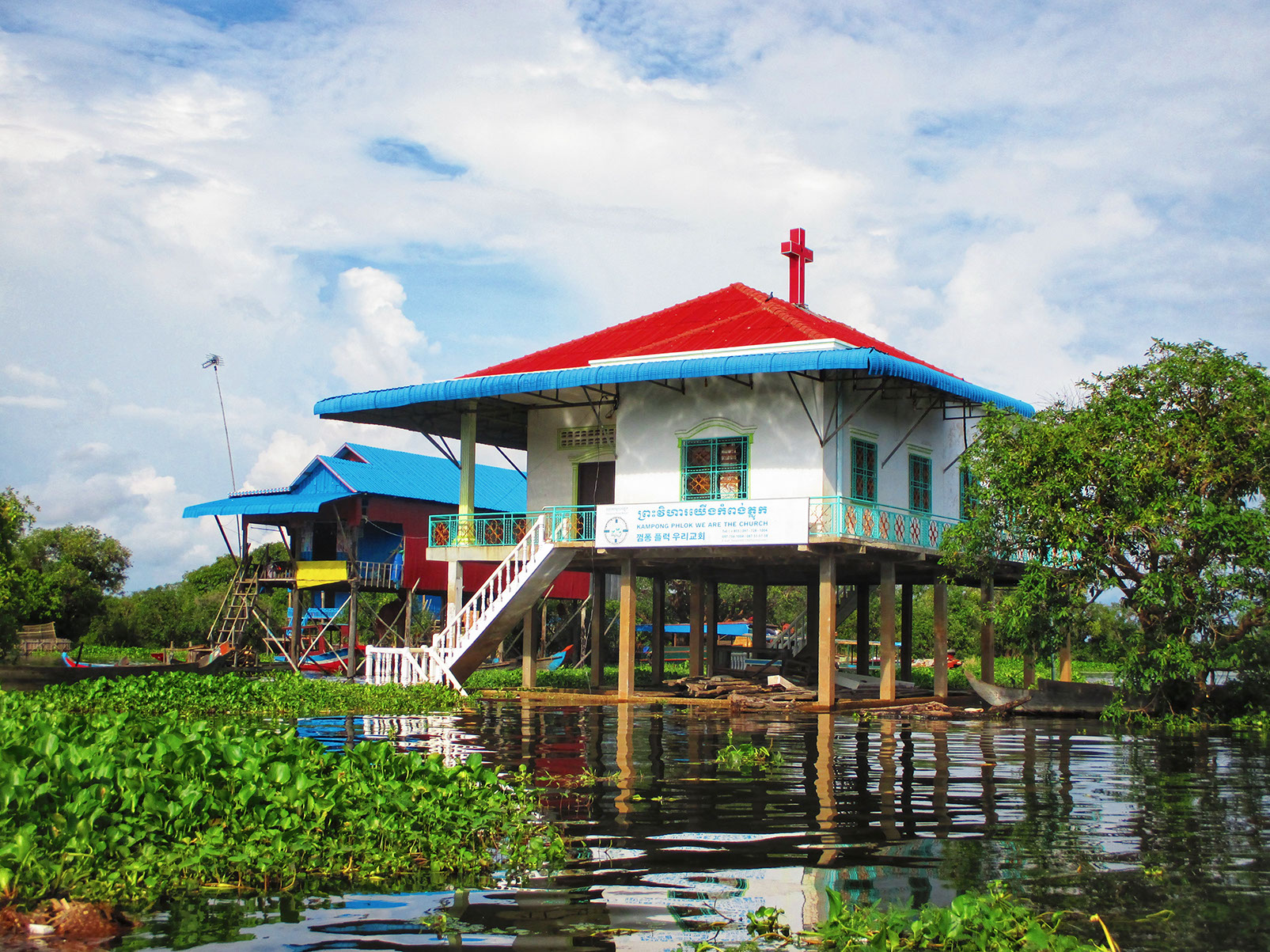
The beautiful Kampong Phluk Catholic Church speaks of a versatile community that lives there
Besides the tour of the floating village, there is another unique experience offered here. A once-in-a-lifetime canoe boat ride inside the flooded forest. After the tour of the village, we were taken to a platform where we got off the boat and crossed a walkway over the flooded forest.
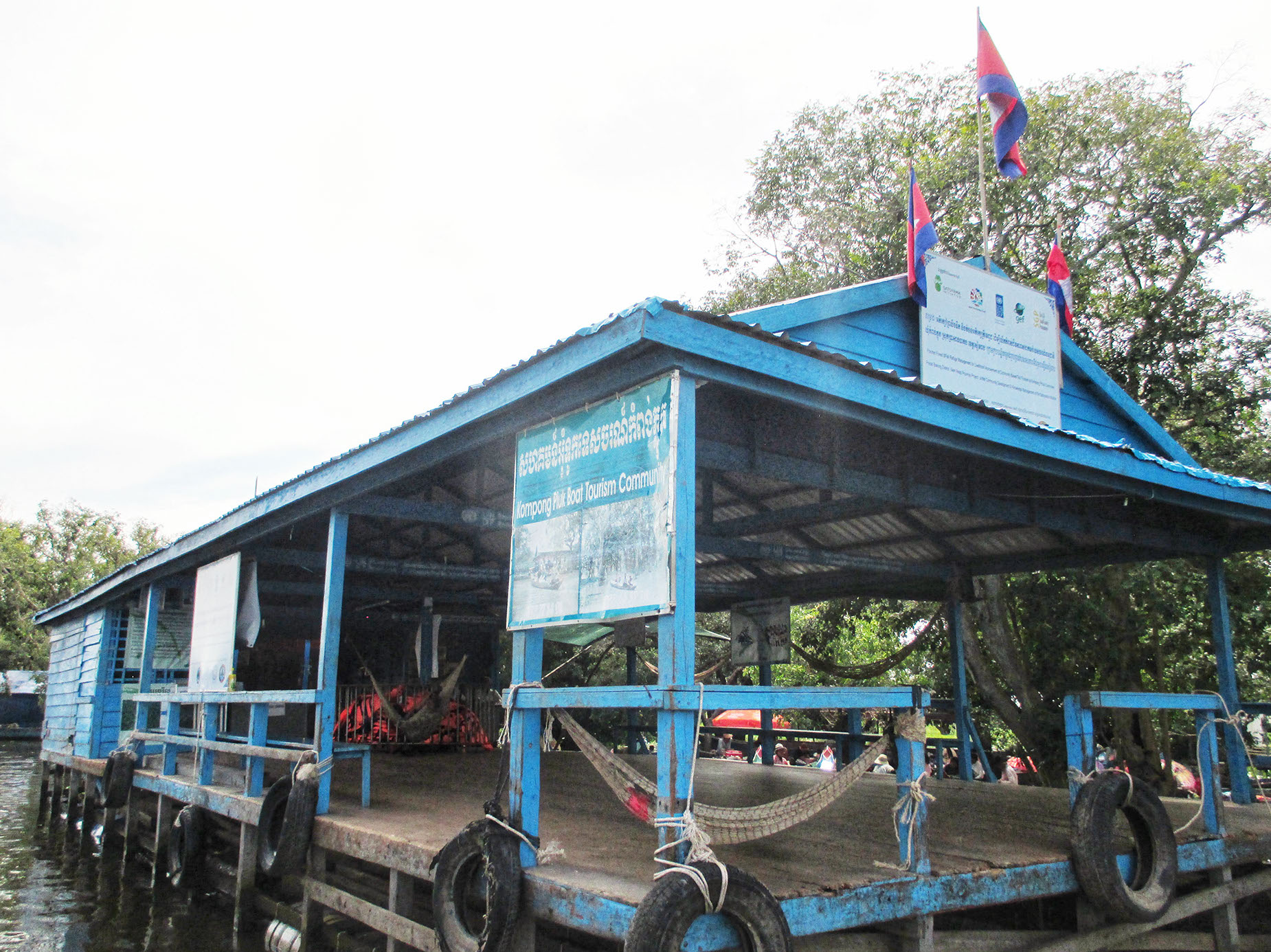
The platform from where we boarded smaller boats to go inside the flooded forest
From this landing, we boarded smaller women-operated boats that accommodate only 2 people, to go into the flooded forest. Something to keep in mind is to purchase your ticket for the flooded forest tour at the beginning itself. If you decide later to visit, you can be charged exorbitantly. In light of what I mentioned earlier, I would advise you to book Kampong Phluk floating village tour with a reputable tour company.
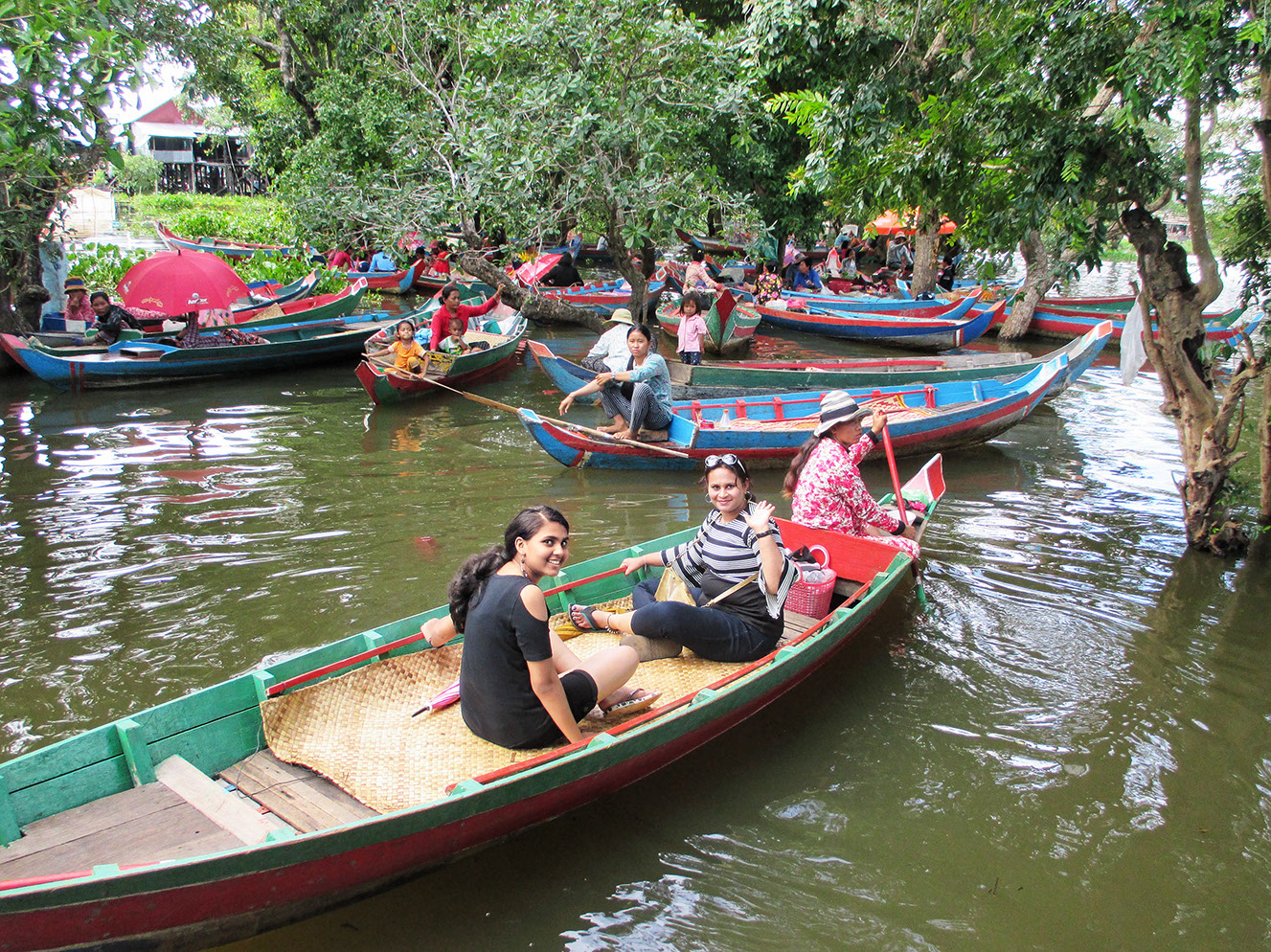
My wife and daughter enjoying the canoe boat ride inside the flooded forest along with other visitors
The boat ride inside the flooded forest was a surreal experience. We were mesmerized by the surroundings as we glided on the water. The greenery was a treat to our eyes and the sounds of this incredible ecosystem was nature music. We were in awe of the deft maneuvering skills of the women taking us on this boat ride as they negotiated the dense vegetation.
Personalized boat ride inside the flooded forest is a MUST have experience while visiting Kompong Phluk floating village
The sun rays were playing hide and seek owing to the thick canopy which added a magical dimension to the ride. While we did not see any water creatures during our ride, I am sure we were surrounded by a plethora of unique and interesting underwater species.
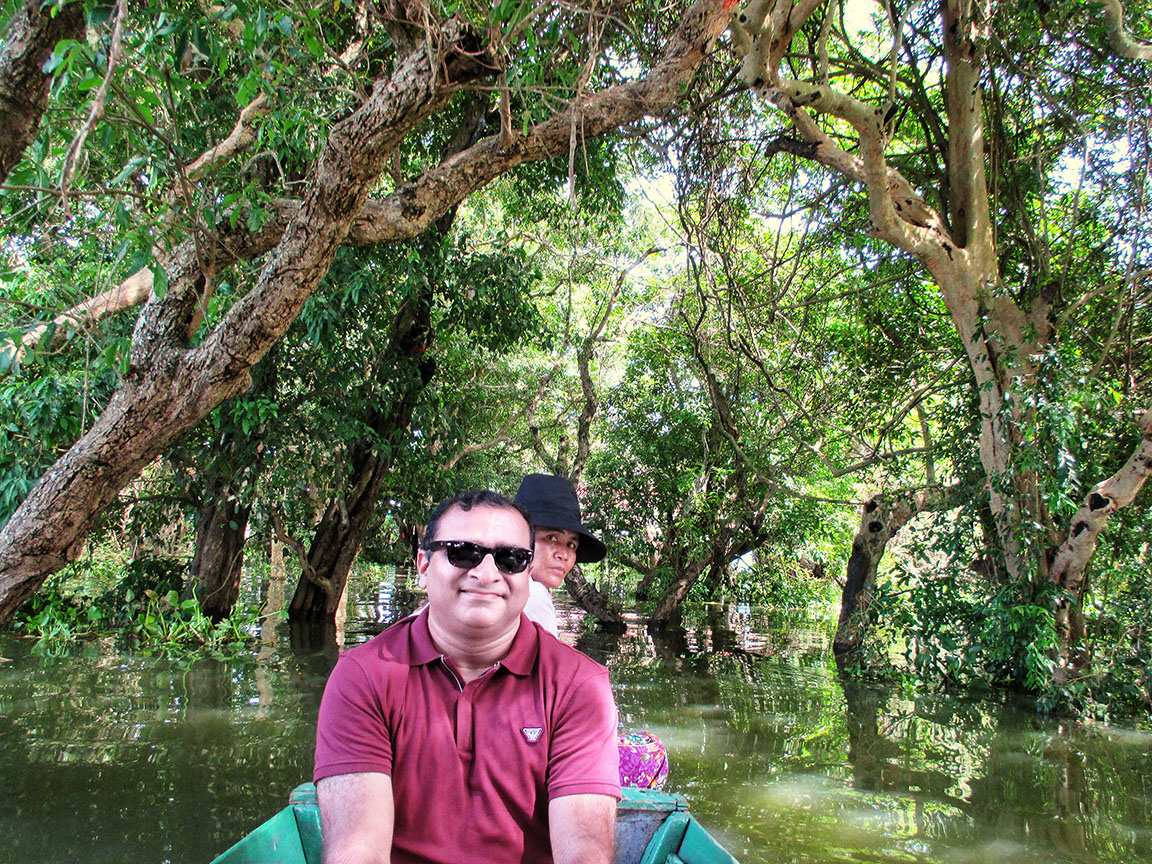
I was delighted to meander through the flooded forest and enjoy the surroundings
Catering to visitors in the flooded forest are locals in their boats filled with snacks, beverages and souvenirs. Patronizing the locals is something I always do while traveling because it is my way of giving back to the local economy. The locals are also very persuasive and more often than not manage to do a decent amount of business. We purchased some snacks and beverages that we enjoyed during our canoe boat ride.
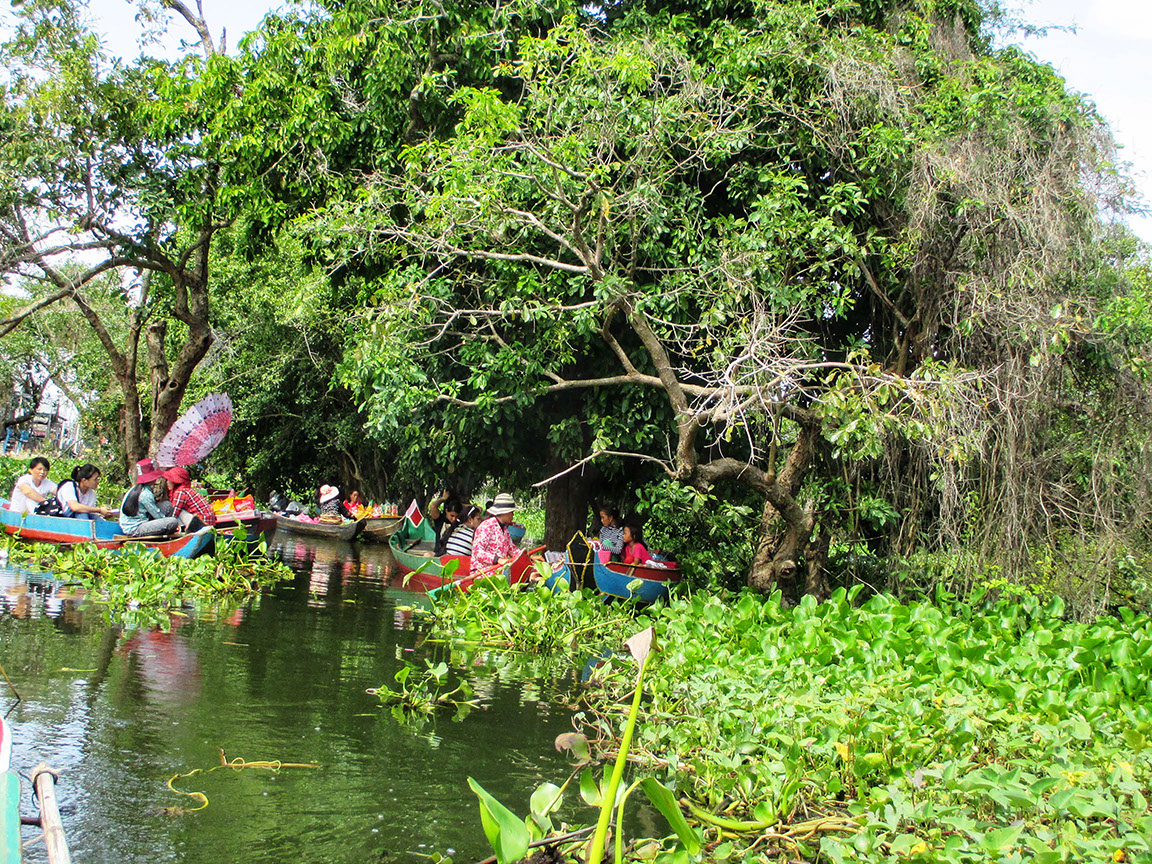
The locals are floating around in their boats loaded with snacks and beverages catering to visitors as part of their livelihood
After a somewhat mystical canoe boat ride inside the flooded forest, we returned to the walkway made of bamboo. This was an incredibly gorgeous place dotted with eatery stalls and souvenir shops where original crocodile leather was sold. The natural surroundings were beautiful and we wandered around for about an hour immersed in the ambience and visiting the crocodile farm.
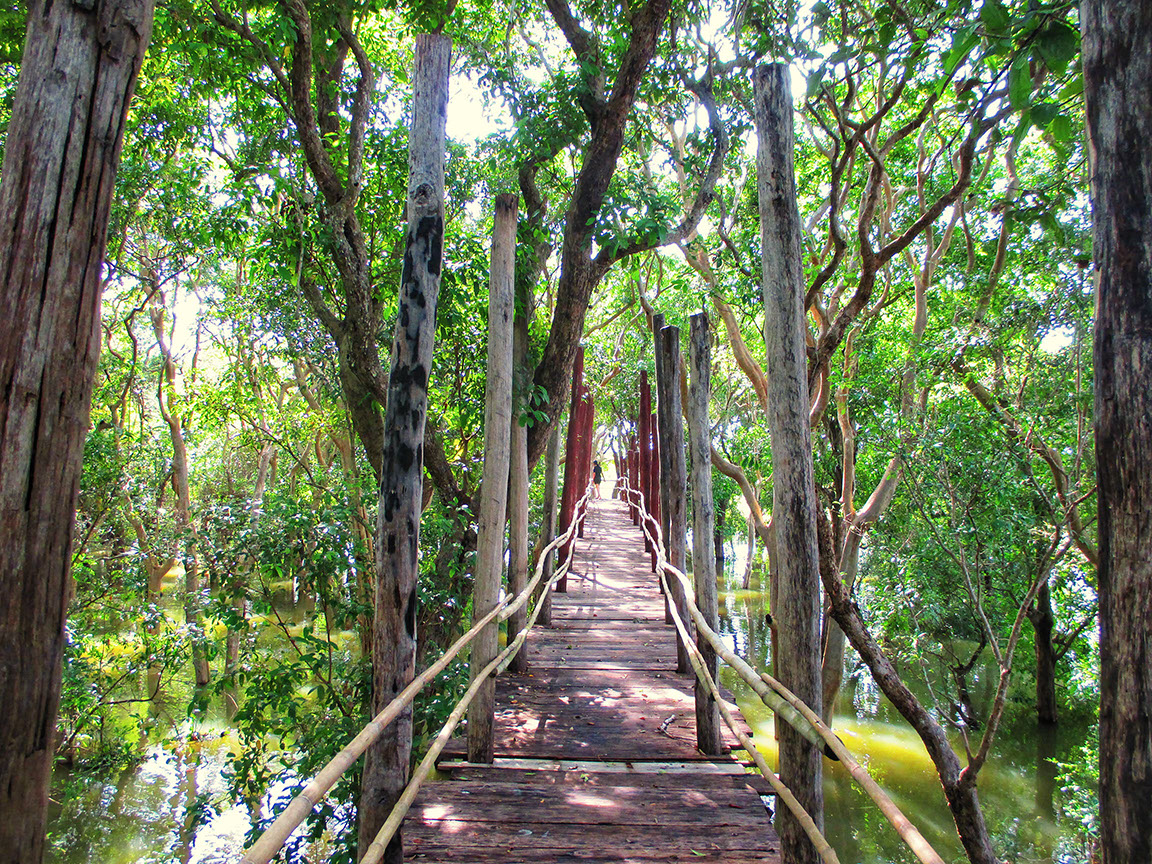
The gorgeous walkway made of bamboo over the flooded forest makes for a beautiful walk
Relaxed, we then boarded the main boat and the boatman took us beyond the floating village. We got to see the vastness of the river and also experience the swiftness of its flow. We felt like we were in the ocean. This extra experience was thanks to the tuk-tuk driver who traveled with us. Taking advantage of the spectacular location, we indulged in a photo session before heading back. Paying extra to the locals is definitely worth it because not only do you have an enhanced experience, it also supports the local economy.
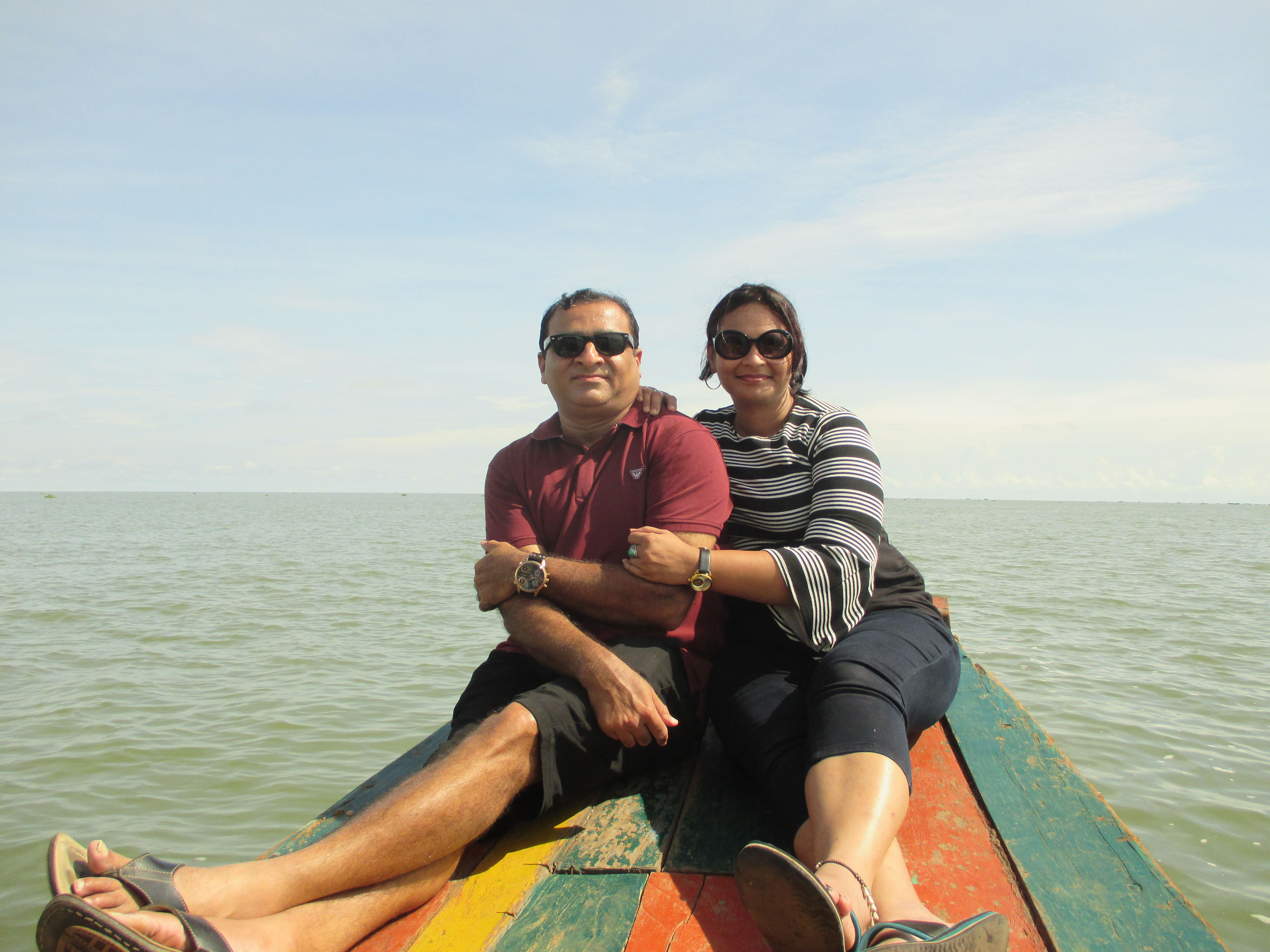
Enjoying some fun photo ops with my wife in the middle of the vast Tonle Sap Lake
We spent over 5 hours in Kampong Phluk but did not even realize how time went by. On our ride back, there were locals selling snacks and local delicacies. We patronized packaged snacks like chips and coke but refrained from the local delicacies. That, in my opinion, would be for the adventurous foodies and bravehearts! As we rode back to the boarding point, we looked back at the disappearing colorful houses of the floating village, truly inspired. We not only had a unique experience but also learnt some enriching life lessons of resilience and determination watching the locals live their daily lives in these challenging environments.
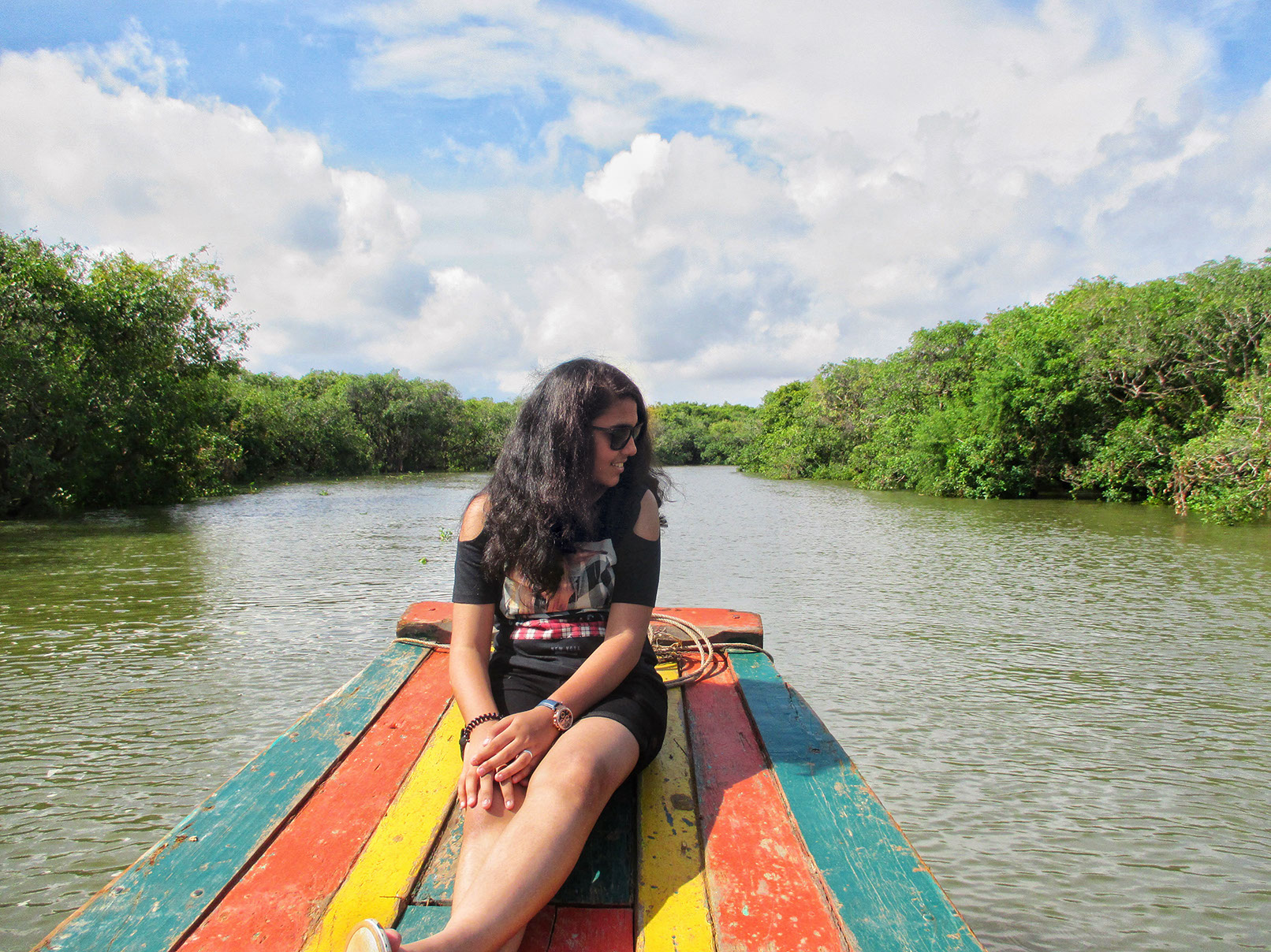
My daughter enjoyed a fun photo shoot in the interior part of Tonle Sap Lake
During my visits, I toured Chong Kneas and Kompong Phluk floating villages but did not get a chance to visit the other two. Kampong Khleang is one of the most remote floating villages and is least visited by tourists. It is a two-hour boat ride from Phnom Krom boat dock and has the largest population of all the villages on Tonle Sap Lake. Mechrey floating village is the entry point into the Prek Toal Core Bird Reserve. The community here survives on fishing and eco-tours. This is the newest of the floating villages to take on tourism. Some say it is authentic, and many reports state that it is also following the suit of others with scams. I hope to visit these floating villages when I get a chance.
Floating villages are an experience in itself. The history, culture and environments of these villages and the communities they comprise are a treasure trove for travelers seeking unique and enriching travel experiences. There are unpleasant narratives about these floating villages which one should take with a pinch of salt. Exercise basic travel caution and you are sure to have an experience of a lifetime, like we did.
Why are there floating villages in Cambodia?
Floating villages are a common sight in Cambodia. They have existed for centuries as a means of livelihood. The villages are built on stilts or rafts depending on the water level. The inhabitants of these villages typically grow rice, vegetables and fruits, and fish for their own consumption. While the floating villages may seem like a novel concept, they serve an important purpose in Cambodian culture and are likely to remain a staple of life in the country for many years to come.
Who lives in the floating village of Cambodia?
The floating village of Cambodia is home to a unique community of people who have adapted to life on the water. Most of the villagers are fishermen, and they make their living by fishing in the Tonle Sap Lake. In addition to fishing, many villagers also grow rice and vegetables in small floating gardens. Life in the floating village is not easy, but the villagers have learned to make the most of their situation.
Can you visit Kampong Phluk Floating Village without making a booking in advance?
Kampong Phluk floating village is a popular tourist destination in Siem Reap, Cambodia. They do not have an advance booking system. One can just go to the ticket counter and buy the ticket for a boat ride in the floating village.
When is the best time to visit Kampong Phluk Floating Village?
Kampong Phluk is best visited during the shoulder season, which is the end of the wet season and the beginning of the dry season. It runs from September to November. During this time, the water in the village is at optimum level and visitors can get a better view of the stilt houses and see how they are constructed. The weather will be quite pleasant during this time, and visitors will have a more authentic experience as the village will be less crowded.
Disclaimer: This blog may contain affiliate links. At no extra cost to you, we may get a small commission if you buy anything. All products and services we endorse have been personally used or come highly recommended to us. These incomes allow us to keep the community supported and ad-free.
What an amazing story! Tonle Sap Lake is known as one of the most vibrant ecosystems in the world, which is why there is a calmness in all images. Just by looking at images, I feel as if I am in that natural environment.

Thank you for stopping by and writing here. Tonle Sap is an amazing place indeed. There are so many things to learn and explore in this eco system.
Name
Email
Comment